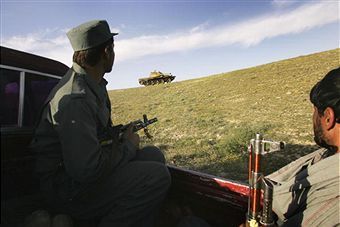 Russia and Nato are now allies, or birds of a feather at least. The Independent reports that the twentieth century’s opposed spheres will work together
for stability in Afghanistan. The attendant irony is blissful. Two years ago, machismo raged between Nato and Russia over Georgia. Why the sudden accord? There are two schools of thought, both
relating to the East’s inexorable rise.
Russia and Nato are now allies, or birds of a feather at least. The Independent reports that the twentieth century’s opposed spheres will work together
for stability in Afghanistan. The attendant irony is blissful. Two years ago, machismo raged between Nato and Russia over Georgia. Why the sudden accord? There are two schools of thought, both
relating to the East’s inexorable rise.
Russia can no longer determine Central Asia of its own accord: China co-opted the Shanghai Cooperation Organization, a long-time pillar of Russian power in Asia, to condemn Russia’s recognition of South Ossetia and Abkhazia – a sign, to Russian eyes at least, of China’s creeping influence in Central Asian politics. Russia has also had to accept that Afghanistan is a threat to its security. According to a recent report, the Russian economy is dependent on 10 million migrants a year, most of them Muslims. It cannot afford a haven for extremism so close to Chechen and other Islamic separatists.
So, it is little surprise that Medvedev and Putin have been trying to bury emnity with Nato and the EU. There has been some success on missile defence already; but all Russian cooperation in Afghanistan is contingent on Nato recognising South Ossetia and leaving the Ukraine and Georgia at arms length. Looking beyond that, Russia seeks closer strategic and economic relations with the European Union – mostly to check Iranian mischief and madness, counter Islamic terrorism, control immigration, relax movement restrictions and customs dues to stimulate economic growth.
Second, and perhaps more importantly, European nations bluffed of their commitment in Afghanistan and the Nato alliance withered in consequence: it now needs all the help it can get. Whether as a consequence of half-hearted deployment or not, the Obama administration is becoming increasingly isolationist in terms of security, determined to withdraw from Afghanistan as soon as possible, having already conceded Star Wars to Russia. The US’s economic foreign policy is also beginning to shun Europe in favour of an eastern El Dorado.
Europe will be increasingly alone in a globalised world, and Russia is its closest and far from warmest neighbour historically. Intoxicated by victory in the Cold War, the previous generation of EU leaders hoped to expand ever eastwards, but the failure of the ‘colour revolutions’ in the Ukraine and Georgia has delineated the limits of EU political and economic expansion: the tide of prosperity and invasive politics will never reach Russia’s oligarchy (Fukuyama himself addressed the topic for the magazine back in February). Closer relations will have to be forged with Russia, to build a structure conducive to political and economic stability. To that end, Medvedev attended the Deauville Conference with Sarkozy and Merkel, because, for the first time in 500 years, Russia and Europe are regional rather than global players.






Comments